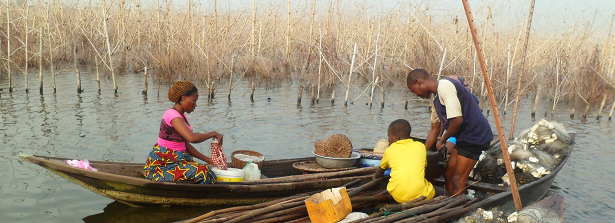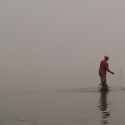What does the fisherman want?

Despite its contribution to the livelihoods of more than 300,000 individuals, to food security and nutrition in Benin, the fishery sector receives less attention from research and policymakers compared to other agricultural sectors. A study conducted among 1,066 inland fishers (including 227 fisherwomen) provided critical information about their activities, vulnerability, resilience and water sharing rules.
Food insecurity prevails among 32 per cent of fishermen
Concerning personal characteristics, 32 per cent of the fishermen experienced a situation where there was no meal (5 per cent) or only a single meal (28 per cent) one day or more in a month, with highest percentages in Porto-Novo (12 and 64 per cent, respectively) followed by a large middle group (Cotonou, Ganvie, Houedome, So-Ava, Vekky and Zoungame). Fishermen are also characterised by a high illiteracy rate (approximately 80 per cent), which restricts labour opportunities; the large percentage of fishermen (58 per cent) who work outside the sector are mostly involved in low-wage labour activities. Hence, a substantial part of the fisher community faces food insecurity and limited opportunities to improve this situation by finding other well-paid jobs.
Fishermen are entrepreneurial
Fishermen are clearly entrepreneurs who invest in their own techniques and tools. Despite their illiteracy, most know how to approach banks or micro-financing institutes and 55 per cent are able to get a loan. Furthermore, acadja (it encloses an area in the lake using wooden poles, creating a safe habitat and breeding ground for fsh) owners know how to organise the labour for harvesting and have good conduits to markets.
The shared water resource management is not functioning well
Despite concrete agreements on fishing arrangements, there is a high number of conflicts (34 per cent), where 12 per cent indicated this happened in the past year. In 50 per cent of the conflicts with members of their own community, there was a violent encounter where people needed medical attention or were killed. Similar numbers were given for conflicts with members of other communities. This is a clear indication that the common property resource management is not functioning well. Comparing Ostrom’s eight prerequisites for sustainable and equitable development of common pool resources with the current situation in the inland lakes of Benin, we see that the required conditions are only partly met.
With 63 per cent of the respondents indicating that they do not belong to an association, while another 20 per cent belong to an informal group, we can conclude that the degree of organisation among fishermen is low. There might be three reasons: mistrust among members of the communities, loss of faith in government institutions, and the sparse contact between the executive board of the national federation of fishermen and its members.
Key recommendations
The study recommends the development of a well-established platform where fishermen can timely express their needs, are actively involved in formulation of policies and receive regular feedback from the association concerning their proposals.
Furthermore, such a platform should:
- be representative for the fishers involved;
- be operational at the level of inland lakes;
- use technical, material and financial capacities to implement mechanisms for concerted action; and
- regularly and timely provide feedback to the fisher community.
It is recommended that the government releases resources and facilitates this transdisciplinary process by (re)-establishing such a platform to formalise and facilitate the contact between the fisher association, its members and other stakeholders.
Furthermore, technical and financial support is needed to develop aquaculture activities, finance capacity building initiatives, increase credit access, organise fishers’ associations to cooperatives and facilitate school attendance to fishers’ children.
Downloads
- Please download the report “What does the fisherman want? Report on the survey among fishers around Lake Nokoué and Porto-Novo Lagoon in Benin” by Ben Sonneveld, Frejus Thoto and Donald Houessou (English version).
- Télécharger le rapport “Que veut le pêcheur? Rapport de recherche sur les pêcheurs autour du lac Nokoué et de la lagune de Porto-Novo, Bénin” par Ben Sonneveld, Frejus Thoto et Donald Houessou (version en français).
_ _ _
This article was published at the ACED website on May 30, 2018, in English and in French.






